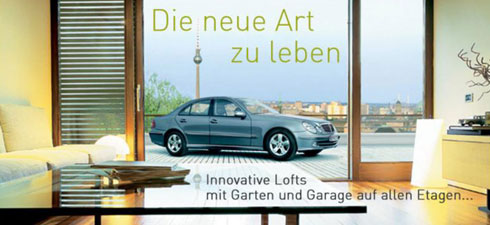Behind Glienicker Bridge In Potsdam stands a sign that’s easy to miss, saying “Germany and Europe were divided here till 6pm on 10 November 1989.” Well it’s 4pm, 21 years later, and now, at Berliner Strasse 74-77a, there’s an electric gate a couple hundred yards from the sign. On the gate is a push-button panel for the residents’ names, only without any names on it.
And there’s a button that reads in three engraved letters: “Ruf” – meaning “Call”. If you press it, a camera starts filming and a porter answers. If he finds your name on his list, the gate buzzes faintly and opens, and you enter Arkadien, Potsdam's gilded cage and Germany’s very first Arcadian gated community.
Twenty one years after the Wall came down, gates are going up in Germany. This time the border doesn’t run between East and West, but between the wealthy and not (so) wealthy. Closed communities on guarded housing estates are popping up in Potsdam and Berlin, Frankfurt and Leipzig, the rich living right in the city from which they are sealing themselves off. Manicured grounds, electric barriers monitored 24/7 by sensors and guards: the sort of thing you see in Los Angeles, São Paulo and Moscow has now hit Germany.
Gated communities commonplace in South America and US
Pleasure steamers glide down the Havel, mother ducks, ducklings in tow, swim by, the autumn sun bathing Babelsberg palace in pink light. Standing on the roof terrace of his 270 square metre penthouse in Arkadien, Uwe Peter Braun, an entrepreneur from Essen, laughs, “The only thing that’s missing is the mountains.” His wife Andrea says, “We often drive to Meran: you want to be sure everything will still be there when you get back.”
The Brauns have drawings by Picasso on the wall, and a desk from the year 1743 in the living room. “I often sit here, listen to classical music and come up with new ideas for patents,” says Uwe Peter Braun, who runs an “innovation networking” company together with his wife. As the twilight thickens, they look reassured when they make out the red lights of the infra-red cameras and sensors in the dusk.
“Gated communities have been commonplace for a long time now in South America and the US. Poverty’s spreading here, too, you know, security’s becoming a more serious issue: so it’s important to cover your back,” explains Uwe Peter Braun. Covering your back is worth plenty of money to the Brauns. They spend €1300 a month on security alone. “I’ve lived cheaper before,” laughs Mr Braun again. But the bill’s not a problem, he adds.
When Andrea Braun drives up to Arkadien gate in her Smart car, when the guard recognises her, the gate opens then closes behind her, she can relax. “Then I feel free,” she says, meaning free of fear. “I can wait for ten minutes in the underground car park and make sure nobody enters that I don’t know.” “You don’t notice” the security precautions and video cameras here, she says. Relaxing is really important to Andrea Braun.
Not everyone is welcome in Kreuzberg
Professor Georg Glasze of the Geographic Institute in Erlangen does worldwide research on gated communities. The monitored, fenced-in housing trend has already hit Poland: gated communities are sprouting up nextdoor to concrete tenement buildings in Warsaw, for example. Gated communities break up cities, says Glasze, driving the poorer segments of the population to the outskirts. But in some places those poorer strata apparently just want to be left by themselves.
Achim Anscheidt thought it over for a minute before talking to a journalist. It’s Saturday, and Anscheidt is debating with his wife and architect which bathroom tiles would work best in in their loft. This brand-new white building with big glass façades is called Carloft. It has made headlines. And demonstrated that not everyone is welcome in Kreuzberg, Berlin.
The air in the Reichenberger Strasse reeks of coal, some of the tenants here still don’t have central heating. At the other end of the street is an anti-Fascist library, another building in the street is bedecked with banners against rent hikes. Carloft sticks out round here like a sore thumb. Its residents can handle rent hikes, and they’re happy they’ll never have to look for a place to park again. You drive in from the Reichenberger Strasse and up to an elevator, press the remote control, within seconds a big grey elevator door opens up. Then you actually drive the car onto your apartment terrace, get out of the car, take two steps and presto, you’re in your living room.
Welcome to Bigshotsville
Opinions may diverge when it comes to putting cars on balconies. Some people actually want that sort of thing. But no there’s no denying what Achim Anscheidt says happened: “We were amazed that Kreuzberg of all places, known for its tolerance, should be so intolerant of the concept.” It turns out that at the topping-out ceremony, the white walls got paint-bombed, trash cans were set on fire, demonstrators yelled at the “fat cats” and them to “get lost”. “I know this never-ending discussion in Germany. Soon as someone says ‘doorman’, it’s labelled elitist housing. I hate to say it but that’s typically German.”
Though maybe just typical of Berlin. New housing concepts are not tolerated in Friedrichshain either. 60 families have been living in townhouses there, in Prenzlauer Gardens, for two years. There’s an electric fence and a little doorman’s lodge, but the residents soon came round to deciding the gate should always be left open – and they don’t need a doorman.
And yet, says one young mother, “Sometimes we wake up in the morning and read graffiti like ‘Fuck Yuppies!’ or ‘Welcome to Bigshotsville!’” This mother is from Munich. Down there, she says, “we don’t know such intolerance”.
Translated from the German by Eric Rosencrantz
Do you like our work?
Help multilingual European journalism to thrive, without ads or paywalls. Your one-off or regular support will keep our newsroom independent. Thank you!












